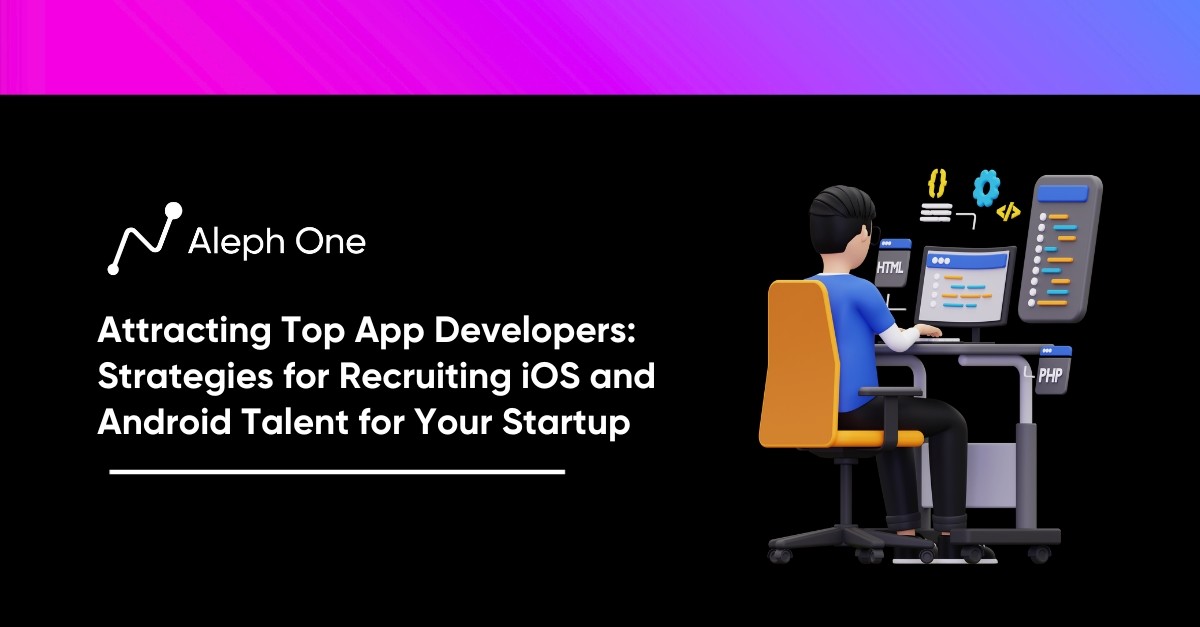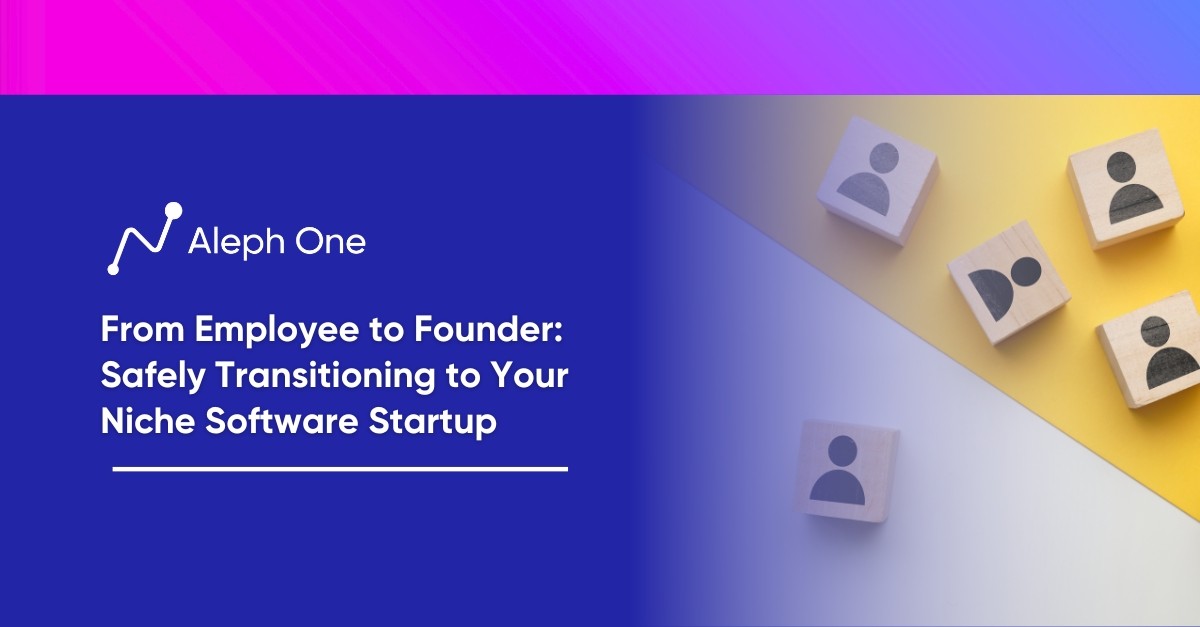Let’s work together to build something amazing. Share your project details and our team will reply to figure out the next steps to your success.

With companies from all sectors vying for mobile app developers to amplify customer engagement, streamline operations, and unlock new revenue streams, startups are engaged in a fierce talent competition. Moreover, the demand extends to developers skilled in emerging frameworks and languages like React Native, Kotlin, Swift, and Google’s Flutter SDK, creating a challenging recruitment landscape. This article delves into strategies for startups to stand out and entice top-tier iOS and Android developers, emphasizing the importance of a compelling job listing, embracing remote work, crafting an attractive company culture, and tapping into developers’ thirst for emerging technologies, including AI, blockchain, and quantum computing.

The Skyrocketing Demand for Mobile App Developers
The demand for skilled iOS and Android developers has skyrocketed in recent years and shows no signs of slowing down. According to Glassdoor, iOS developer jobs in the U.S. have increased by over 150% since 2012, while Android developer jobs have increased by over 110%. These roles are among the highest paying, with average base salaries of $136,000 for iOS developers and $114,000 for Android developers.
Supply of Top Developers Have Not Kept Up with Demand
Companies across all industries seek mobile developers to build apps that enhance customer engagement, improve business processes, and tap into new revenue streams. Startups, in particular, need iOS and Android talent to build and scale their mobile products. However, the supply of top developers has not kept up with demand, creating a highly competitive job market.
Frameworks and Languages
Developers with expertise in emerging frameworks and languages are in incredibly high demand. For example, many companies are looking for developers with skills in React Native, a framework for building cross-platform mobile apps. There is also a strong demand for Kotlin, a modern programming language that makes Android development faster and more fun. Other sought-after skills include Swift, Google’s Flutter SDK, and knowledge of mobile app security and privacy best practices.
Global App Demand
Several trends are fueling the increasing demand for mobile developers. The first is the overall growth of mobile apps, with global mobile app revenue projected to reach $935 billion by 2023. The rise of technologies like the Internet of Things and augmented/virtual reality also drive demand, as they rely on mobile apps to control smart devices or enable AR/VR experiences. Additionally, companies need mobile developers to help them meet the needs of mobile-first customers who spend most of their digital time on smartphones and tablets.
Mobile developers have become a hot commodity, and competition for top talent is intense. Startups need to position themselves as an attractive place to work if they want to recruit and retain the best iOS and Android developers. This means competing with larger companies on key factors like compensation, culture, work-life balance, and opportunities to work with cutting-edge technologies. The demand for mobile developers shows no signs of slowing down, so startups that get it right will be poised for success.
The Allure of Big Tech: Why Top Developers Don’t Come Cheap
Major tech companies like Google, Facebook, and Netflix can attract top developer talent with high salaries and attractive perks. According to Glassdoor, the average base pay for a software engineer at Google is over $100,000. Experienced developers and specialists can make $200,000 or more. These companies are known for over-the-top benefits like gourmet meals, onsite gyms, and generous parental leave.
Raising Developer Salaries
In recent years, there has been an arms race with big tech companies raising developer salaries to lure talent away from competitors. For example, in 2015, Google raised salaries for all employees by over 10%, and Facebook followed suit, increasing pay for engineers by up to 35% in some cases. These pay hikes at the top put pressure on other companies to raise salaries to compete.
Startups Need to Make Strong Offers to Candidates
For startups, the implications are significant. It is difficult for early-stage companies to match the compensation provided by tech giants. However, startups need to find ways to make strong offers to candidates they want to hire to pry them away from cushy jobs at major companies or prevent them from accepting offers from competitors. Options like equity, bonuses, and additional paid time off can help make up for differences in base pay.
Creative Recruiting Tactics
Some startups are getting creative with their recruiting tactics to stand out. For example, one startup offered candidates a $10,000 signing bonus if they accepted the job within 24 hours. Another promoted their company culture by offering unlimited paid time off and a work environment focused on work-life balance. These innovative perks and benefits can be very appealing, especially for millennial and Gen Z developers entering the workforce.
While competing on salary alone is not realistic for most startups, companies need to ensure they offer compensation and benefits packages that align with the broader tech industry. They also need to highlight other benefits of joining an early-stage company, like opportunities for ownership, career growth, and making an impact. With the right combination of pay, perks, and a compelling company mission, startups can attract top talent despite the allure of big tech.
Crafting an Irresistible Job Listing: Insider Tips from Developers
To attract top iOS and Android developers, you need to create a job listing that speaks directly to their fundamental interests and priorities.
Developers want to Understand Company Culture and Work Environment
First and foremost, developers want to understand the company culture and work environment. They are looking for listings that give a sense of the company’s mission and values, team dynamics, and work-life balance. For example, a listing that mentions a collaborative team, flexible work hours, and a commitment to continuous learning or open-source contributions would stand out.
Technologies and Types of Projects
Developers also want to see the technologies and types of projects they would work on. Listings that mention modern frameworks like React Native, cutting-edge machine learning applications, or virtual reality platforms would pique their interest. However, the specific tech stack is less important than the opportunity to build innovative solutions and gain valuable experience. Listings that seem repetitive or boring—such as building another social sharing app—are a turnoff.
Career Growth
Career growth is a high priority for developers, so they look for listings discussing mentorship and skills development opportunities. For example, a listing could highlight how senior developers mentor junior team members or how the company provides resources for developers to learn new programming languages and frameworks. Discussing a clear career path from a junior to a senior developer role is also appealing.
Mission and Impact
Finally, while salary and perks are significant, developers are also motivated by a company’s mission and the impact of the work. Listings highlighting how the work contributes value to customers or makes a meaningful difference globally will resonate most with top talent. For example, a listing for an AI company improving healthcare or education outcomes would be compelling.
Create a job listing that gives developers a sense of your culture, work, and mission. Be authentic and help them understand why your startup is an exciting place to build innovative solutions and advance their career. With the right message, you can attract developers who share your values and passion for creating a great product.
The New Norm: Remote Work is Here to Stay
The COVID-19 pandemic forced many companies to shift to remote work, and for many developers and tech companies, this is now becoming the new normal. Surveys show that 83% of developers want to continue working remotely at least part of the time after the pandemic.
Work-life Balance
For developers, remote work offers a better work-life balance without a commute, more flexibility, and, in some cases, lower costs of living. For companies, a remote engineering team expands the talent pool, reduces costs, and allows for 24/7 work cycles.
Startups looking to tap into this remote talent pool must build a culture supporting virtual teams. This starts with the right tools, including video conferencing software, project management platforms, and chat apps that enable constant communication. But more than technology is needed. Startups also need to foster remote inclusion and collaboration actively. This means setting shared working hours, organizing virtual social events, and promoting transparency across the team.
Asynchronous Work Culture
Leading tech companies with remote teams, like GitLab, Zapier, and Doist, emphasize an asynchronous work culture, documentation of all processes, and shared values and mission to unite distributed teams. They focus on outcomes and work quality rather than hours logged or face time in an office. This results in highly productive remote teams that feel deeply connected to the company mission.
Building Remote Engineering Brand
For startups, building a remote engineering brand starts with the company’s culture and values. A solid remote culture that promotes work-life balance, inclusion, and transparency will attract top remote developers. Startups should highlight their remote culture on their careers page and job listings. They should also consider sponsoring and participating in virtual hackathons and developer events.
While remote work poses some challenges, startups that embrace it and build the right culture will tap into a growing talent pool of top developers who crave flexibility and work-life balance. The future of work is distributed, and startups need to enable and empower remote teams to compete for the best engineering talent. With the right brand and culture, startups can attract and retain world-class developers from across the globe.
Standing Out from the Crowd: Building Your Startup’s Brand
To attract top developer talent, startups need to build a compelling brand highlighting why the best iOS and Android developers want to work for them. A strong engineering brand communicates the company’s mission, culture, work environment, and opportunities for innovation.
SpaceX
For example, SpaceX has built a powerful brand as the place for engineers who want to push the boundaries of space exploration and work on ambitious, cutting-edge projects. Stripe is known for its mission to increase the GDP of the internet by making it easy for developers to build businesses online. The company is also known for its developer-friendly culture and work on complex challenges in payments infrastructure.
Social Media, Online Communities, and Influencer Marketing
Social media, online communities, and influencer marketing are vital to building a startup’s engineering brand. Startups should share updates on their engineering blog about the technologies they are using and problems they are solving. They should post about their culture and work environment on platforms like Instagram and build an active presence in relevant Reddit and Hacker News communities. Identifying and engaging key influencers in their industry can help to amplify their brand to the right audience.
Highlight Unique Opportunities for Developers
To stand out, startups must highlight opportunities for developers to work with emerging technologies like machine learning, blockchain, and virtual reality. They should emphasize how developers can build innovative new products and push the boundaries of what’s possible. Startups should share concrete examples of the types of projects developers would work on and the problems they would solve.
Building an authentic brand that highlights these elements can help startups attract developer talent even without the resources to match big tech salaries. Developers are motivated by high pay and the chance to do meaningful work, tackle exciting problems, and build new technologies to make an impact. By crafting the right brand and message, startups can tap into these motivations and stand out.
The Future is Now: Emerging Tech that Developers Crave
Developers are always on the cutting edge of technology, eager to build new things and push the boundaries of innovation. Startups that want to attract top tech talent must tap into developers’ desire to work with emerging technologies shaping the future.
Artificial Intelligence and Machine Learning
Artificial intelligence and machine learning are fields that have captivated developers. Job postings for AI and ML engineers have skyrocketed over the past few years. Developers are eager to build intelligent systems that can learn independently, solve complex problems, and gain insights from vast amounts of data. Startups in industries from transportation to healthcare are developing new AI and ML applications, attracting developers.
Blockchain
Blockchain, the technology behind cryptocurrencies like Bitcoin, is another area gaining significant interest. Blockchain allows multiple parties to have a secure and trusted transaction without a central authority. Developers see opportunities to build new types of decentralized applications using blockchain technology. Cryptocurrency startups and companies in finance, supply chain management, and other industries are hiring developers to build blockchain-based solutions.
Quantum Computing
Quantum computing is an emerging field that could transform computing in the coming decades. Instead of the binary bits of traditional computers, quantum computers use quantum bits or “qubits” that can represent multiple states at once. Developers are fascinated by the possibilities of quantum computing to solve currently intractable problems. Tech giants like Google, IBM, and Microsoft have built early quantum computers and are attracting developers to help develop new quantum algorithms and applications.
Attract Well-Qualified Talent to Your Startup
By working at the cutting edge of fields like AI, blockchain, and quantum computing, startups can tap into developers’ desire to build future technologies. Providing opportunities to work on innovative projects using these technologies is key to attracting top developer talent in an increasingly competitive job market. Developers want to push the boundaries of what’s possible, and startups can give them a place to do that.
FAQ
What has contributed to the soaring demand for mobile app developers, and how are companies responding to this demand?
The exponential growth of smartphone users and the rise of new technologies like IoT and AR/VR have substantially increased the demand for mobile app developers. There’s also an ever-increasing market for innovative apps that improve business processes and customer engagement. As a response, companies offer competitive remuneration packages and enticing work environments. They also prioritize developers with expertise in emerging frameworks like React Native and languages like Kotlin.
What competitive strategies are startups using to attract top developer talent, given the high salary offerings from established tech giants?
While startups may struggle to match the hefty salary packets of tech giants, they are getting creative with their offerings. Equity, bonuses, relaxed working hours improved work-life balance, opportunities for continued learning, and clear career progression paths are some strategies they use. Additionally, they emphasize the significant contributions that developers can make in early-stage companies, which often is more appealing than cash incentives.
How is the rise of remote work shaping the landscape for startups in terms of attracting and retaining top developer talent?
The COVID-19 pandemic amplified the shift towards remote work, and it appears the trend is here to stay. Startups are taking advantage of this by building cultures that support and promote remote teams. This approach allows access to a broad talent pool irrespective of geographical constraints. They focus on creating flexible schedules, promoting transparency, and offering toolkits for seamless communication. By doing so, startups are more likely to attract developers who prefer remote work powered by autonomy and work-life balance.
Get the latest news and updates from Aleph One in your inbox.



